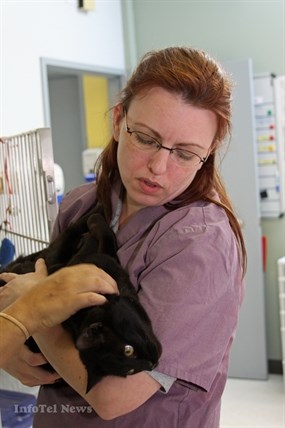
Staff at the Kamloops SPCA branch are trying to contain a ringworm outbreak at the shelter, resulting in a temporarily shutdown that could last more than six weeks.
(JENNIFER STAHN / iNFOnews.ca)
November 07, 2013 - 10:16 AM
KAMLOOPS – The local branch of the B.C. SPCA had to shut down after a kitten and a puppy tested positive for ringworm this week.
Branch manager Charleen Holloway says they are currently in the midst of testing and/or treating the 79 animals at the shelter and as a result will not be bringing in, or releasing, any animals at this point in time, that includes any adoptions already set up.
“I had to kick out people in the lobby when the call came in,” Holloway says. “The virus spreads through contact. We can get it as humans. Shedders will shed the virus with it and we can carry it on our clothes to home, to another animal. ”
The last time a ringworm outbreak occurred at the shelter, more than a year ago a, they were able to quarantine the infection to one cat room but the facilities were still shut down for six weeks, a timeline Holloway says is one of the best case scenarios.
“With the last closure we had it was six weeks, which is on the good side,” she says. “(It) can last weeks past this depending on the severity of the outbreak.”
Each of the animals testing positive for ringworm, which can leave patchy, circular areas of hair loss and red rings on the skin, will undergo three lime dips per week until tests show they are rid of the virus.
This 'horrendous' iodine-like dip can be particularly hard on the animals with open lesions, Holloway says, as staff will have to scrub the open wounds to clean them properly.
“It's an emotional hardship and a financial hardship,” Holloway says with obvious emotion. “It could definitely set some of them back in terms of being ready for adoption.”
The two animals that tested positive were brought to the shelter a week ago from the same home and have since visited many areas of the building. As a result many items in the facility will have to be replaced, including the chairs in the main area, cat posts, bedding and towels.
Holloway believes the cost just to test and treat the animals will likely range from $2,000 to $4,000, depending on how many animals it has already spread to. The shelter is still taking donations during regular hours and are currently in need of old towels and bedding. The rest of the furniture, such as cat posts and chairs, will need to be replaced after the virus is eradicated.
Staff won't have an idea how long the doors will be closed until all the testing is done. Testing on the remaining animals will take place Wednesday and it takes a week for the results.
To contact a reporter for this story, email jstahn@infotelnews.ca, call (250)819-3723 or tweet @JennStahn.
This story was updated at 8:51 a.m., Nov. 6, 2013.
News from © iNFOnews, 2013